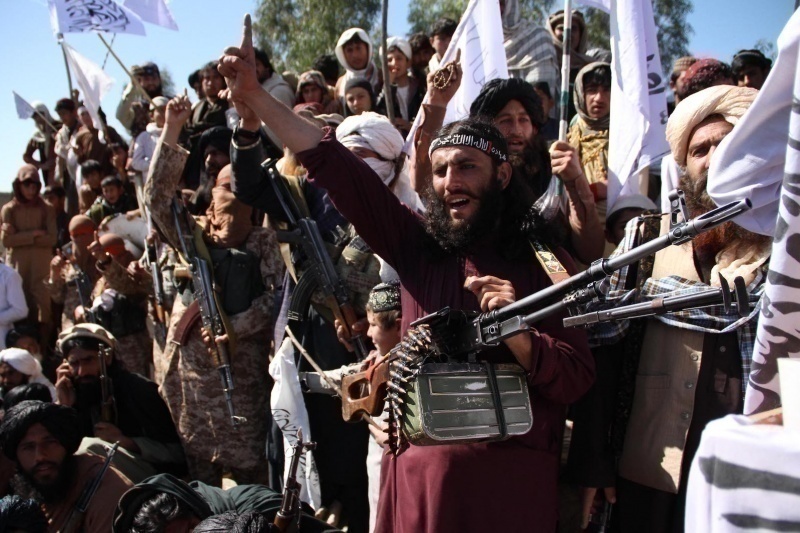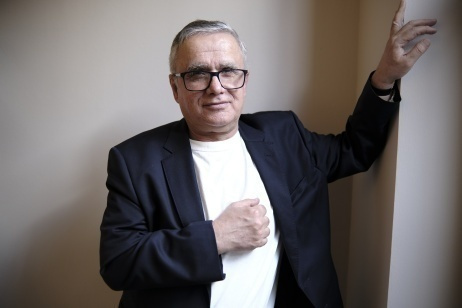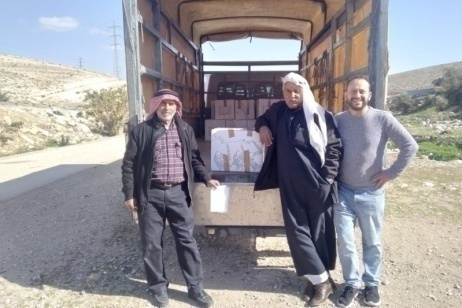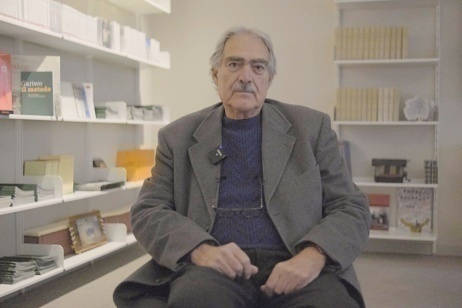As US forces complete their withdrawal from Afghanistan, it is estimated that the Islamic Emirate of the Taliban has captured more than a thousand units of US Army armored vehicles in the last two weeks. Such a show of strength is proof, if any were needed, of the euphoria that surrounds the Taliban's military campaigns at the moment. Meanwhile, the government of Ashraf Ghani keeps losing authority in the eyes of citizens and the military (thousands have recently left the country for Pakistan, Uzbekistan, and especially Tajikistan), and there is fear for the fate of the civilian population. To date, the Taliban directly controls more than a quarter of all 421 districts in Afghanistan. To better comprehend the situation and the risks to Hazaras, Uzbeks, Tajiks, Baluchis, Nuristanis, and all other minorities in the country, we contacted Basir Ahang, a journalist and writer who has worked for a long time for UNHCR and whose articles were published on leading international newspapers.
Basir, what is going on?
We are heading for another war, but this one will be nothing like the ones before. The Taliban are much more aggressive. These days I see that they are also very active on social media, with messages of hatred towards minorities and, in particular, the Hazaras. They tell us that now that the Americans left, we will have to pay for our "betrayal". Unfortunately, this language does not belong only to the local Taliban but also to people who have studied and now live abroad.
The news talks about actual sieges, which recall sad events from the past. How are the Taliban taking over entire regions of the country?
For more than three months now, the Taliban have surrounded some of the areas where the Hazaras live, such as Mazar-i-Sharif, Daykundi, and Ghazni. In one district of Mazar-i-Sharif, Charkint, the Taliban have blocked the roads with mines, and many people are stranded with no food. A journalist from Foreign Policy has spoken out about the conditions of the population: the inhabitants, who are very poor, have sold their animals and the little they had to buy weapons and defend the city.
What is the government doing to defend these cities?
The central government has not given any support to local communities. There are no military bases in the areas where the Hazaras live, and no soldiers arrive from Kabul. The Taliban have used this strategy - to siege and let people starve - even in the past. For example, in Ghazni, where I lived, the Taliban blocked the roads for four years. A sack of flour cost five and a half million Afghani, the local currency. No one could afford it.
And are they using the same strategy today?
Yes. In Charkint, the World Food Program has only been able to access the area once in three months and provide only half the population with food because the mines make passage impossible. Just think about this: when they kill someone, they even put bombs inside the bodies to confuse those who pass by. They do terrible things. In Daykundi it has been like this for months. In the district of Pato they have burned and destroyed all the houses.
Back to the government: why is the government doing nothing?
Ghani's strategy is odd, to say the least. When the Taliban took control of more than a hundred districts in recent months, the government did not support local forces at all. Since Ghani has been in power, we have lost 70,000 soldiers.
How shall we interpret these numbers?
In all these years, there were almost only people belonging to the Pashtun majority in the prisons. Based on a questionable idea of social justice, Ghani decided to slow down the army's defense strategies against the Taliban. He started to micromanage how and when the military responds to the Taliban. When an attack occurs, military leaders must contact the defense ministry, which in turn must request permission to defend themselves from the presidency. Without Ghani's signature, the military cannot defend itself. This is absurd. It makes me think that, for Ghani, the Pashtun supremacy, which has always been in control of the country, is more important than defending against the Taliban, who themselves are Pashtuns.
Which means that the residents of more remote areas are left to themselves.
The Hazaras are the most vulnerable in such a situation: we have no weapons, we have nothing. Historically, we were the first to lay down our arms and celebrate democracy. We studied, built schools, and gave up the armed struggle. On the one hand, this is good because Hazaras have founded almost all private universities. But, on the other hand, with the ongoing war, it's all a matter of survival, and we have no means to defend our families. In my province, Ghazni, only three districts are under government control. The Taliban control all the others. But the worst is yet to come. Right now, the Taliban is focused on stabilizing their operations on the ground. Then the actual slaughter will begin, I fear: they will take over and deal with everyone else.
Do you think it is just a matter of time for the Taliban to seize power?
At this stage, Ghani is not leaving the government, but I think he is part of the problem. Last year, a local defense group was formed in Behsud against the Taliban, but the army preferred to fight the Hazaras, even though they were fighting under the Afghan flag. So, again, Ghani seems primarily concerned about Tajiks, Hazaras, and Uzbeks threatening the Pashtun domain. One recent case is very emblematic in this respect.
Which one?
Two weeks ago, there was a huge deployment of Taliban forces from the south to the north. Police in Kabul had arrested a caravan of buses carrying thousands of people who claimed they were going north to work. Imagine if there is work for thousands of people in northern Afghanistan! They were going to war. They were held for two days. Then the government ordered to free them.
The US withdraws from the country. What do you think of Biden?
I don't think Biden was ever really interested in Afghanistan, even when he worked for Obama. He thought the whole effort was futile. But, on the other hand, there is the national interest and the relationship with the other powers: China, Russia, and Iran. The United States wants to be there but does not want its presence to be over-expensive. They have now decided that defending a government of national unity and investing in democracy is too expensive. Instead of sending two billion a year to the local government, it is cheaper to strike a deal with the Taliban to avoid major damage. I'm sorry to say this, but today it seems to me that the promise of democracy was propaganda to gain access to the territory.
You mentioned China. There is lot of work in place to include Afghanistan in the new Silk Road.
It all depends on the Taliban, on whether and from whom they are willing to be controlled. For China, they are a threat. They do not know any law, pact, dialogue, or respect for agreements.
Are there any positive figures emerging in this chaos?
I will be honest. I don't think the leaders of the traditional Hazara, Uzbek, and other ethnic groups' parties will be able to counter the Taliban. They are old and have safe escape routes in case of danger. Moreover, there is another issue. Islamic extremism attracts many young people, even among the Tajiks and Uzbeks. This is why I say that we cannot counter the Taliban through ethnic identities: today's youth are more interested in fundamentalist ideology than they are in ethnicity. Ethnicity cannot be the answer.
You have plenty of dialogues with diaspora intellectuals to understand the future of the country. What comes up from them?
We recently met on ClubHouse. According to many young Tajiks, Hazaras, and Uzbeks, a split between those who want to live democratically and those who abide by Sharia dictates is the only solution. In their view, coexistence is impossible. They want a new country and consider it unacceptable that, in the Twenty-first century, terrorists taken for spiritual leaders could govern Afghanistan. They do not understand how people with doctorates from the best universities in the world should live under the control of people who have never opened a book in their lives.
Have you tried to engage in a dialogue with Pashtun intellectuals?
In the last few months, we have tried very hard without much success. For some of them - one of which has even a master's degree from Cambridge University - the Taliban are freedom fighters. They fear the Northern Alliance's seizure of power and criticize their human rights violations and the fact that they may undermine national security. Yet, they gloss over the Taliban's violations. They have connections with all the intelligence services in the world. But, unfortunately, without dialogue, there is no peace. We don't have a common language: we talk about women's rights, about democracy, about working together so that anyone, regardless of ethnicity and gender, can try to become president. Why can't we have a Sikh, Hindu, Baluch, Nuristani... woman president?
Has there been a time in the twenty years since the fall of the Taliban regime when you felt like things might really change in Afghanistan?
Yes. Between 2002 and 2006, I hoped that we could eventually be free and grow collectively as a democratic country. Members of the minority groups were also beginning to take on roles of power. Yet, something changed in late 2005, when some Pashtun intellectuals began to say that power could not be shared.
Then there were the peace dialogues with the Taliban.
The idea spread that it was a mistake not to involve the Taliban in the Bonn conference [in November 2001, the historical Afghan political leaders met in Bonn under the aegis of Kofi Annan's United Nations to discuss the country during the post-Taliban transition]. It was said that the Taliban had to come back to discuss things together. Even in Italy, a robust international network was created, which saw the Taliban almost as revolutionaries. I remember journalists writing benevolent biographies of Mullah Omar. All this made me feel horrible.
How did we come to this?
The plan was to reintegrate the Taliban into Afghan social life. Each Taliban member who decided to be part of it received 2500 dollars, a salary, and a pass to travel from one region of the country to another. They were able to move freely, without risks of being controlled. They enjoyed near-total impunity. Concretely, this was an invitation to re-organize forces and move armaments. Government-backed groups of Pashtun nationalists brought groups of Taliban northward in army helicopters, carrying the war northward. Our hope was short-lived. I do not blame it all on Karzai's government, but I cannot forget the Western foreigners, often from the left, who thought that helping the Taliban was against capitalism. They said this without really understanding what they were talking about. After all, if the Taliban took power, these people could not enter Afghanistan, and they would be hanged for being infidels.
What do you think about today's media coverage of Afghanistan?
It must be said that minorities, particularly us Hazaras, were historically discriminated against, which has hardly been addressed. With regards to the present situation, I keep seeing fascination with the Taliban. To me, this is unbelievable. I hear people saying that the Taliban is not what it was in the 1990s, that a kind of new identity has cleaned up their crimes.
During the bloodiest moments of the ISIS terrorist attacks, the Taliban were almost seen as allies against extreme evil.
The point is that, in Afghanistan, ISIS does not exist. Those who fought alongside Isis in the north are now leaders of the Taliban leading the war. Now, they are no longer seen as terrorists but rather as heroes fighting for freedom.
You have been questioning those who say that today's Taliban are not those of the 1990s. Yet, it is true that many of the people fighting today were not born in the 1990s, or at least they were children. What do today's Taliban look like?
They are unpredictable and have so much anger toward the others that, if they could, they would tear you apart. Before, in the 1990s, they did things more programmatically.
Can you give us an example?
Not long ago, in some provinces, they destroyed cities by blowing up buildings. Do you know those videos around the internet where they blow up old and abandoned buildings in Western cities? Well, they have learned to do the same thing. However, they do it with new buildings, which were built with money from the cooperation partnerships. They destroy them because they are a symbol of the enemies. By doing so, they will destroy Afghanistan in its entirety! Anger blinds them, and they do not understand that they could use these buildings too. When they took Kabul in the 1990s, they used to cook inside the presidential palaces; now, they want to destroy them as Western symbols. This is what they do to the buildings. Now, think about the people. Tajiks, Uzbeks, and Hazaras are seen as traitors to be killed. During a debate on ClubHouse, I said that the Afghan people are tired and do not want the Taliban. One of their supporters, who lives in the West, told me that sharia will be imposed by force and that we must resign ourselves to our fate.
What can we do in the West?
Be informed and disseminate knowledge of what is taking place in Afghanistan. The Taliban had slaughtered children, even when they were in their mothers' bellies or in children's hospitals. Through kamikaze attacks, they have killed thousands of people who had nothing to do with the West. We have to say it loud and clear: they are a terrorist group and a threat to humanity. We need a worldwide alliance to speak out about what is taking place in Afghanistan. When the Taliban will seize power, a new genocide could occur, just like it happened in Iraq with the Yazidis at the hands of the Isis. Let us start a worldwide dialogue about what is happening. Today, we have forgotten about Afghanistan. If we do not start now, it will be too late to save at least some civilians.







